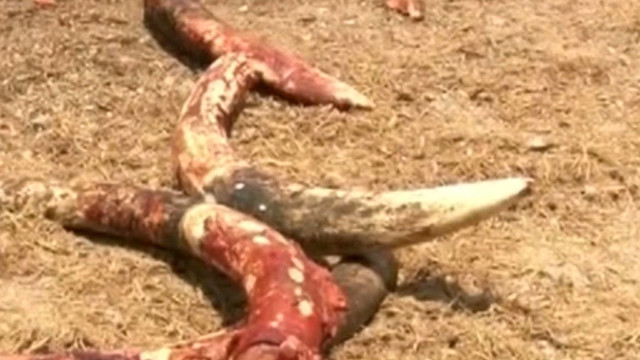A ban on ivory sales and processing in China has taken effect. Wildlife activists said it’s a vital step to reduce the slaughter of elephants, and that it sends a stern message to poachers and buyers alike. CGTN’s Yao Chin reports on why this ban comes at a significant time.
The tusks from these once magnificent animals might once have ended up in shops across China. A life spent roaming the vast savannas of Africa, reduced to a little trinket. But not anymore; as of January 1, 2018, China stands with the elephants.
“China made the ivory ban to conserve the elephants in the world and to give a clear signal to the world that we hope will give a positive signal to pay much more attention to the conservations of elephants,” said Zhang Dehui, Director of the Wildlife Conservation Division of the Forestry Ministry.
“China’s ban will give a better environment for law enforcement, and give the public a clear signal: don’t buy ivory products in China.”
According to a recent survey, 19 percent of those asked said they would continue to buy ivory after the ban comes into effect.
When asked if he had a message for those who may still buy or sell ivory, Zhang responded that, “Not only the seller but the buyer will be punished by the law if some illegal trade occurs. Some will be fined, and the serious ones will be sent to prison.”
That warning is being heeded. The World Wildlife Fund (WWF) co-produced a market survey across China in 2017, and found that 31 percent of those surveyed said they will no longer buy ivory because of the ban.
“The WWF welcomes the domestic ivory trade ban imposed by the Chinese government,” said Lo Sze Ping, the CEO of WWF China.
“This is a very bold action to save African elephants. Everyone should applaud this bold action. In recent years, we see a paradigm shift of the Chinese government in how it sees its role in international environmental issues, including on climate change, on oceans, and now on illegal wildlife trade.”
“However,” he said, “the Chinese government alone is not going to solve the planet’s problems. The Chinese government took a very important step ahead. We need other neighboring countries, other governments, to also step up to the challenge in a concerted way. We also need to educate consumers to avoid buying ivory products as well as other illegal wildlife trade products.”
At Beijing’s Panjiayuan flea market a few years back, there used to be several elephant ivory traders. They’ve been forced to close.
The battleground to win the hearts and minds of would-be elephant ivory buyers is not in Beijing, but in China’s smaller, provincial cities, where 34 percent of those surveyed said they bought elephant ivory products in the past year, and where the incidence of repeat buying is on the rise.
There, many still see elephant ivory products as a status symbol.
So as China sends a message to the world about how seriously it takes its global environmental responsibilities, it will also be making clear at home that there is no status to be had in a criminal record.
 CGTN America
CGTN America
